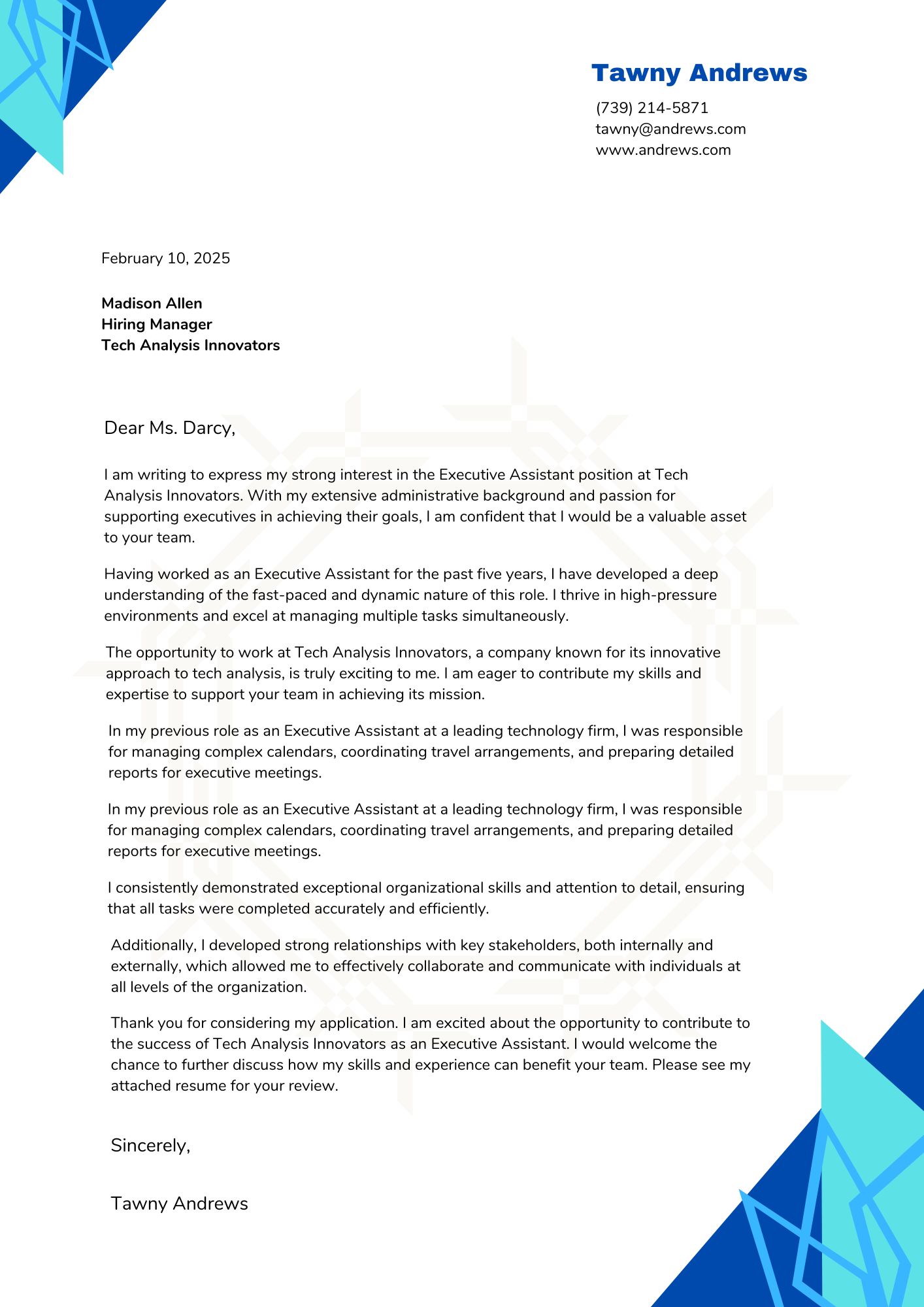Writing an effective executive assistant cover letter requires attention to detail and a focus on showcasing your unique qualifications. Executive assistants are the backbone of any organization, providing critical support to executives and ensuring the smooth operation of daily activities and strategic initiatives.
Their role, often complex and demanding, requires exceptional organizational skills, keen attention to detail, and the ability to anticipate and respond to the needs of executives and teams. A well-structured cover letter is a powerful tool to stand out, make a memorable impression, and secure a coveted interview opportunity.
In this article, we’ll teach you how to create an excellent cover letter that complements your professional resume and improves your application. This comprehensive guide will equip you with everything you need to write a compelling cover letter that will help you land your next executive assistant job.
Who is an executive assistant?
An executive assistant is a sort of administrative specialist who assists one or more senior executives in a company. The role is typically accessible in any setting where high-level managers work, including enterprises, government organizations, medical facilities, and academic institutions.
Executives can improve their productivity and effectiveness by hiring an executive assistant. Some of an executive assistant’s tasks may overlap with those of an administrative assistant, although there are significant differences between the two roles.
Answering phone calls, greeting and receiving guests, scheduling schedules and calls, handling letters, and reviewing papers are all chores that executive assistants perform on behalf of an organizational leader rather than the entire staff.
They commonly perform higher-level tasks as well, such as conducting research, writing reports, supervising staff, and training employees
How to write an executive assistant cover letter
Follow these 6 steps to write an executive assistant cover letter;
1. Introduction
Your cover letter’s introduction serves as your first impression. Use this opportunity to grab the hiring manager’s attention and express your enthusiasm for the executive assistant role. Start with a warm greeting and a brief introduction of yourself.
2. Highlight Your Relevant Experience
Emphasize your relevant experience in providing administrative support to executives. Use specific examples to showcase your skills in managing calendars, coordinating meetings, and handling confidential information. Quantify your achievements whenever possible to demonstrate your impact.
3. Showcase Your Organizational Skills
Executive assistants are known for their exceptional organizational skills. Use this section to highlight your ability to prioritize tasks, manage multiple projects simultaneously, and maintain efficient office operations. Employers value candidates who can keep things running smoothly in a fast-paced environment.
4. Emphasize Communication Skills
Effective communication is key for executive assistants. Showcase your strong written and verbal communication skills, including your ability to draft professional correspondence, screen calls, and liaise with internal and external stakeholders. Highlight any languages or software proficiency that sets you apart.
5. Express Your Interest in the Company
Show genuine interest in the company by researching its mission, values, and recent accomplishments. Tailor your cover letter to align with the company’s culture and goals. Express why you’re excited about the opportunity to contribute to their success as an executive assistant.
6. Closing Strong
End your cover letter on a strong note by reiterating your enthusiasm for the position and your confidence in your ability to excel as an executive assistant.
Thank the hiring manager for considering your application. Express your readiness for an interview to further discuss how you can contribute to the team.
3 Cover Letter Writing Tips for Executive Assistants
Here are some tips you can apply while writing your executive assistant cover letter.
1. Showcase Your Ability to Handle Confidential Information
Executive assistants often have access to sensitive or confidential information. It’s important to show potential employers that you are trustworthy and can handle such information with discretion.
If you have specific examples of situations where you successfully managed confidential information, include these in your cover letter.
However, remember to respect the confidentiality of your previous employers and avoid sharing any specific details that should remain private.
2. Demonstrate Your Problem-Solving Skills
Problem-solving is a key skill for executive assistants. You are often the first point of contact for resolving issues or challenges within the office.
In your cover letter, highlight instances where you have successfully solved problems or overcome challenges.
This could include resolving scheduling conflicts, troubleshooting technical issues, or finding creative solutions to logistical problems. This will show potential employers that you are resourceful and can handle unexpected situations.
3. Express Your Ability to Work Under Pressure
Executive assistants often work in fast-paced environments and need to juggle multiple tasks at once. In your cover letter, it’s important to convey your ability to work under pressure and prioritize tasks effectively.
Provide examples of times when you’ve successfully managed a high workload or met tight deadlines. This will reassure potential employers that you can handle the demands of the role and stay calm under pressure.
Sample of an executive assistant cover letter
Here is a modern sample executive assistant cover letter. You can use our sample template or follow the same steps to create yours.


Free Executive Assistant Cover Letter Download PDF
Executive assistant skills
An executive assistant should have the following important competencies:
Communication
Communication is the ability to convey ideas clearly and effectively. As an executive assistant, you can expect to perform a variety of communication-based tasks, such as writing correspondences and reports, relaying messages to and from staff and even advising an executive on certain decisions.
Attention to detail
If you have strong attention to detail, you tend to focus closely on all of the various aspects associated with a task, thus leading to thorough and accurate work.
This type of careful focus is important for catching mistakes before they become serious problems.
Problem-solving
Problem-solving is the ability to analyze a challenge, consider your choices, and determine the best way to overcome it.
Executives are responsible for addressing the major obstacles impeding their organization’s progress. Often, an executive may ask for an assistant’s insight into a matter to help devise a solution to a particular problem.
Organization
An organized person is capable of thinking and acting systematically. They often have a logically arranged workspace and keep track of details using an easy-to-understand method.
Being organized typically facilitates the timely and accurate completion of tasks, which is essential for executive assistants since they’re responsible for keeping leaders on course with a regularly shifting series of duties.
Time management:
Time management is the ability to use your time efficiently. It’s common for executive assistants to handle a large number of tasks on a given day.
Moreover, they’re also responsible for an executive’s time, making sure that they address all of their obligations.
Interpersonal skills:
Interpersonal skills are qualities that allow you to act cordially with the people with whom you interact. Professional interactions are an important part of an executive assistant’s job.
Cover letter mistakes to avoid as an executive assistant
Its sure that many candidates seeking to become executive assistants make mistakes in their cover letters because they never knew what they should have done. But you can avoid these mistakes below:
Failing to Highlight Relevant Skills
One common mistake that executive assistants make when writing their cover letter is failing to highlight their relevant skills.
As an executive assistant, you are expected to have a wide range of skills, including organization, communication, time management, and more.
When writing your cover letter, it’s important to not only mention these skills but also provide examples of how you’ve used them in your previous roles.
This will give the hiring manager a better understanding of your capabilities and how you can contribute to their organization.
Writing a Generic Cover Letter
Another mistake is writing a generic cover letter. Hiring managers can easily spot a generic cover letter and it often gives the impression that the applicant didn’t put much effort into their application.
To avoid this, make sure to tailor your cover letter to the specific job and company you’re applying to. Research the company and mention specific details about it in your cover letter.
This will show the hiring manager that you’re genuinely interested in the role and the company.
Being Too Humble
Being too humble can also be a mistake. While it’s important to be professional and not come off as arrogant, it’s also important to confidently showcase your skills and achievements.
Writing a Long Cover Letter
Lastly, writing a long cover letter can be a mistake. Hiring managers often have to go through numerous applications, so they appreciate concise and to-the-point cover letters. Aim to keep your cover letter on one page.
Conclusion
Crafting a standout executive assistant cover letter is crucial to making a strong impression on potential employers. By following these expert guidelines and using our sample as a reference, you can create a compelling cover letter that highlights your skills and qualifications.
Remember to customize each letter to align with the job requirements and showcase your ability to excel in a fast-paced executive environment.



 Jobi.ng
Jobi.ng



